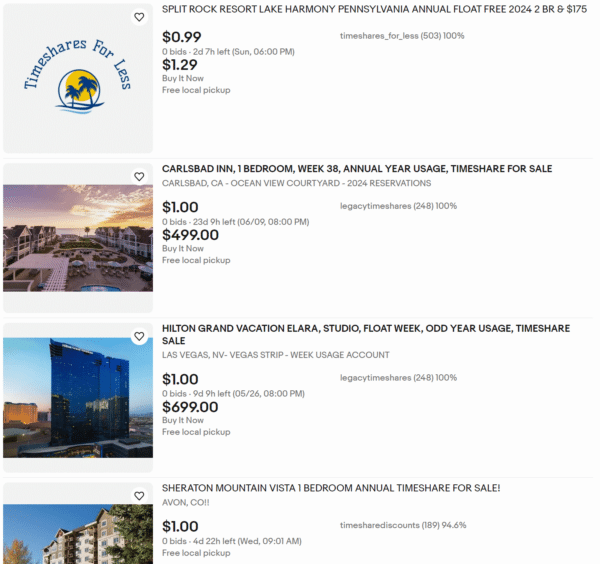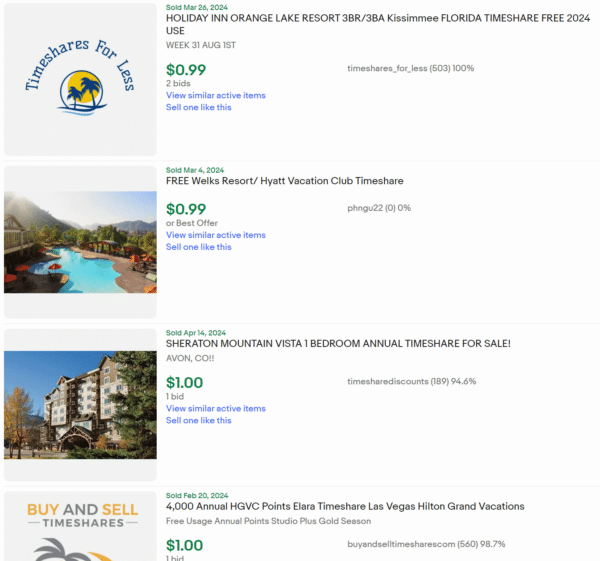You aren’t going to make money on a timeshare purchase. A timeshare will cost you forever, and you won’t even get to use it much either.
I recently had the opportunity to travel with my partner and some friends to Hawaii. Our purpose was leisure and not business, and yet there was a mercantile aspect to our trip. A friend of mine had gotten us all a hotel room in a fancy resort, all heavily discounted for one reason: she was taking part in a timeshare presentation.
I haven’t written about timeshares in many years, but it’s important enough—and can be financially devastating enough—that it’s important to talk about it again.
So let’s dive in. If you’ve ever thought about a timeshare as an inexpensive vacation opportunity, then read on.
Table of Contents
What is a timeshare?
A timeshare is a contract that you undertake with a resort or hotel chain that allows you fractional/temporary ownership in a stay.
Traditionally, this meant that you bought the ability to stay in one place at one property for one week every year or so. But recently this has been converted into a kind of points-trading scheme, where instead of a single place, you get points which you can trade toward another resort in the ecosystem, thus giving you more flexibility.
A fact worth mentioning here is that when you purchase a timeshare, you purchase it in perpetuity. It doesn’t go away, and it is not easy to sell. When you die, you can pass it onto your heirs (unless they refuse it).
Are timeshares a good idea?
No.
At best, they are inflexible and expensive. At worst they are an endless financial drain on your life, like the world’s worst mortgage that will never be paid off.
But don’t take my word for it. Here’s an eBay search for timeshares. Notice that the going price for many of these are $1.
Or if you think those are going to be bid up, here’s a listing of completed auctions:
That’s how much timeshares are worth on the open market.
A really bad idea
One of my first blog posts on this site was called “If they are advertising it, you don’t need it“. And I still largely stick by this point. The more heavily something is advertised (at least in the private sector) the less important it must be.
And timeshares are heavily promoted. Just walk down any area that’s for tourists. You’ll see kiosks with “discount tickets” and “ask me about free resort stays” or something like that. You might even be accosted by a salesperson, wanting to know if you want to see a show tonight. All that it costs is signing up to watch a 90 minute presentation.
If timeshares were a good idea, none of this would be necessary. There would be waiting lists for timeshares, and you’d have to hound the companies for a chance to buy one.
If timeshares were a good idea, then “timeshare exit companies” (no link here because of potential for scams) wouldn’t exist, because people would be lining up to take them off your hands.
Are you smarter than the timeshare people?
But let’s say that you fancy yourself slick, a deal-maker even. Maybe you could make this work.
The timeshare presentation people see you coming. And in fact, they encourage this line of reasoning in their presentations.
“If you can’t go one year, you could always sell the stay to someone else.”
Yes, that’s it! There’s an opportunity here. You could rent out your timeshare to other people. Hell, you could maybe even make money on this purchase!
Horrifyingly, I actually knew someone who bought a timeshare under this premise. But he was wrong, as you can easily see.
First of all, you have maintenance fees that you need to pay every year in perpetuity, so that’s a sunk cost. And for you to profit off of your timeshare, you have to, in effect, become a landlord every year, selling and managing someone else’s stay from afar.
Didn’t work out? Tough, that’s your loss. Had problems with your “renter”? Tough, that’s your loss. Forget to do it one year? Tough, that’s your loss.
You take on all the risk, and if you’re lucky, you might end up with a profit one time. But you have to do this for the rest of your life.
You can’t even use the points
I have a personal experience with timeshare points.
My partner’s parents own a timeshare, and they had the points version. They had hundreds of thousands of points, most of which they could never spend each year.
So they offered them to us if we could find a use for them.
Now I fancy myself a travel hacker of sorts, so I figured that this would be easy, just requiring diligence and tenacity.
But I couldn’t do it. No place had availability, not on the days we could go, and when we finally did find a place that was available, the fine print told us that there were hundreds of dollars in maintenance fees that we had to pay. In effect, the fees were roughly equal to what we would spend if we just rented our own place without the timeshare!
Sure, your experience may vary, but note that you still take on all of the upfront financial risk here.
What about the free presentations?
My friend swears by these timeshare presentations. She’s done many of them, always says no, and then somehow always gets invited back to do it all again.
I’m impressed, though the whole thing seems more than a little stressful to me.
Also, I’m not sure the benefits are worth it. You don’t usually get a free hotel stay (at least not anymore), but instead just a discounted one. That’s fine if you like the resort they’re setting you up in, but otherwise, I think you could find a nice place for the same discounted price, and then not have to be on the mailing list of the timeshare people.
What to do instead
Just plan a vacation. Save up money, and then go where you want to go.
Don’t bother owning something that locks you into a specific place or specific company. Take the money that you’d spend in maintenance fees, and put it into a travel bucket. You’d be surprised how quickly $100-$200 a month adds up.
And without the yoke of the timeshare, you can go anywhere, on your terms, whenever you want.




